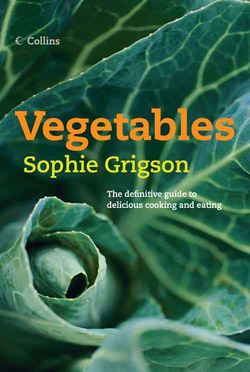Читать книгу Vegetables - Sophie Grigson, Sophie Grigson - Страница 6
ОглавлениеAuthor’s acknowledgements
My initial encounters with vegetables were, without exception, positive, thanks to my mother, the late Jane Grigson, who cooked them with care and love. I have her to thank for making vegetable-eating a pleasure right from the start, and for encouraging me to experiment with both familiar and new vegetables in later years. More recently, the regular weekly box of vegetables from Riverford Organics has shown me what an extraordinary difference genuine freshness makes to even the most pedestrian vegetables.
I would also like to acknowledge the debt I owe to so many of my friends, who have put up with me moaning about how long it has taken to pen this book, and above all to my editor, Denise Bates, and all of her team at HarperCollins, for their extraordinary patience and forbearance. The wonderful Susan Fleming has fitted copy-editing around the piecemeal delivery of the various sections of the book without a murmur of annoyance, at least in my hearing.
Once again I have been lucky enough to work with William Shaw, one of my favourite photographers (despite his appalling jokes), backed up by a wizard team consisting of the blessed Sam Squire on food and the long-suffering Rosie Dearden on styling – a real diamond, even though she doesn’t like cheese. Weird.
A big thank you to Zoltan and the cheery gang that run the coffee machine at Esporta in Oxford, which is where I retreat to write in relative peace. Annabel Hartog and Leslie Ball have helped me test recipes at home, while Sarah and Jennine have kept house, children and admin running smoothly. Last, but by no means least, a big thank you to the two most important people in my life, Florrie and Sid, who make me laugh, shout, get up in the morning, listen to Radio 1, and question almost every assumption I’ve ever made. They are also pretty good at eating vegetables. What more could a mother hope for?
Publisher’s acknowledgements
Thank you to North Aston Organics for their help with photography of vegetables, and The Conran Shop and Harrods for the loan of props.
Cook’s notes
There is one important element of vegetable preparation that I have omitted from the individual entries for fear of tedious repetition: unless they are to be peeled, all vegetables should be rinsed before use. Beautiful earthy potatoes and other roots will obviously need to be scrubbed as well, so a vegetable brush is an essential piece of equipment. A nail brush fits the purpose well enough, but make sure that everyone in your house knows and respects the fact that it is only to be used for vegetables, and not to scrub engine oil or paint off soiled hands.
In most instances, precise measuring of ingredients is not absolutely necessary. Take vegetable quantities as rough guidelines. Unless you are making something like the carrot cake on page 28 or the potato cakes on page 73, a little more or a little less will not ruin a dish. There is no point wasting a quarter of a potato, when following a recipe for mash, for instance.
On the whole, it makes sense to stick with either imperial or metric measurements. It makes life simpler, if nothing else. I often suggest using handfuls of this or that. Some people find this frustratingly vague, but it allows whoever is using the recipe to make their own decisions about the final strength of flavours in a dish. Ingredients, particularly herbs and vegetables, vary greatly from one batch to another, from one season to another. As cooks, we have to take this in our stride, adding a little bit more here, a little bit less there in order to compensate for fluctuations in flavour.
Unless otherwise specified, eggs are always free range and always large. Spoon measurements are rounded. I use a standard 15 ml tablespoon, 10ml dessertspoon and 5ml teaspoon. Recipes that include olive oil will taste better if made with extra virgin olive oil. Herbs are all fresh, with the exception of bay leaves (good fresh or dried) and dried oregano (use the fabulous Greek rigani, dried wild oregano, if you can get it), which is more exciting than fresh. Pepper and nutmeg should always be freshly ground to maximise spicy impact.
Finally, remember that suggested cooking times are not absolutes. Every oven has its own individual quirks, and settings vary. Similarly the width and make-up of saucepans will affect cooking times. So, check foods regularly as they cook, and if they look done, smell done, taste done, they probably are.
